Hank Kwon knows what it takes to build a comics store from the ground up. His twenty-plus years in the business of selling comics saw him go from street vendor ventures to setting up shop throughout the convention circuit to get his product into readers’ hands. The experience he accumulated gave him the confidence to open his own shop Bulletproof Comics, located in 2178 Nostrand Ave., Brooklyn, NY (in the Flatbush area).
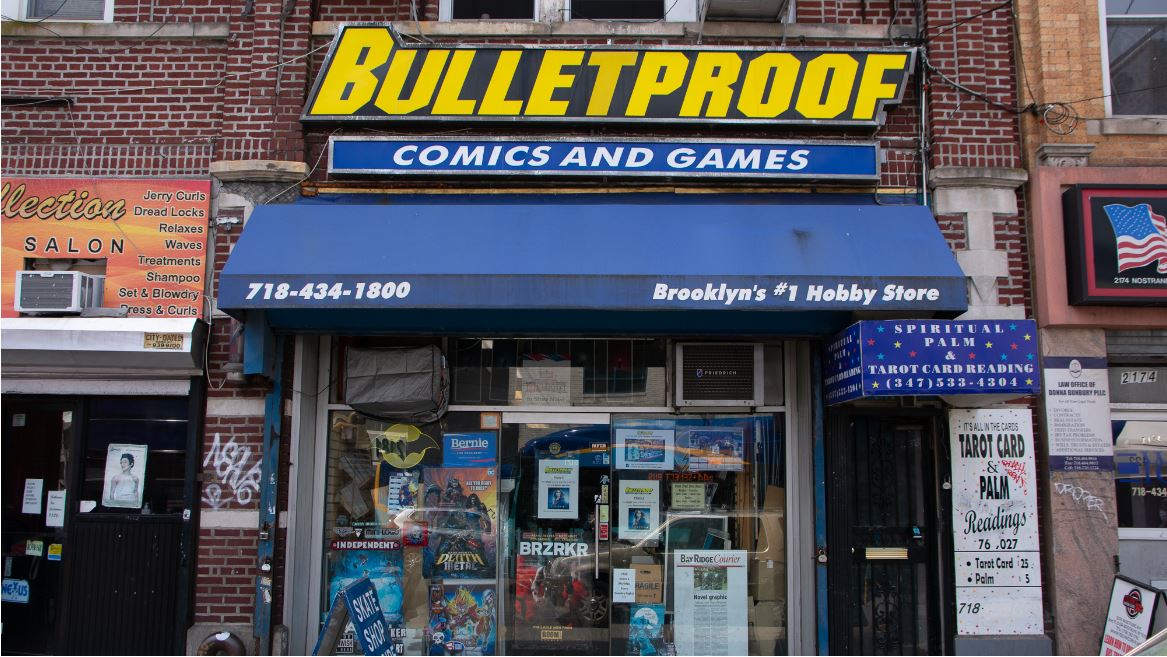
From the very first time I entered the store, soon after moving to New York, it immediately became one of favorites in the city. The reason? It felt like home. Hank (as everyone calls him) was instantly welcoming and would go out of his way to engage with customers. When he learned I moved to the city to be a Social Studies teacher in Brooklyn, the first thing he did was find a box of free comics and donate them to me so I could use them in my classroom. He continues to do so.
Bulletproof is known for being a kind of social hub that is primarily a comic book shop but that also invests in having a well-rounded and dedicated skateboard and longboard offering along with a robust playing card selection complete with tournaments and pre-release events. The shop even offers skateboarding lessons to those interested in getting into it.
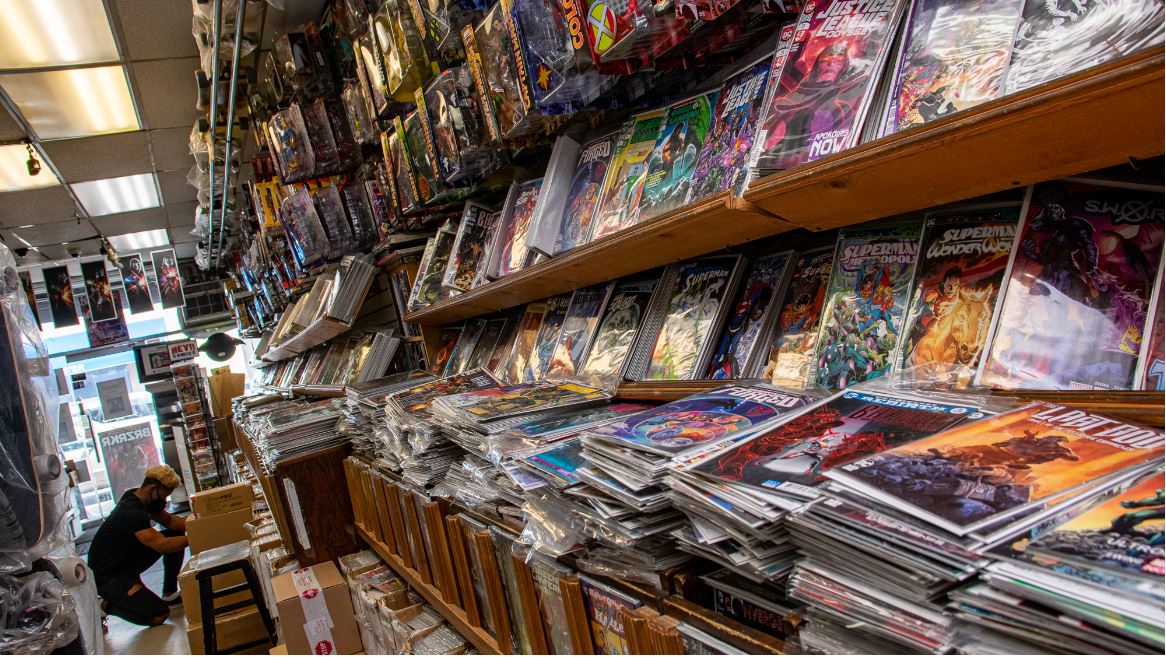
Just recently, Bulletproof also opened an original art gallery (on the second floor of the building where the shop is) featuring store-exclusive variant cover paintings by Italian artist Gabrielle Dell’Otto. Potential buyers can visit the gallery and get a guided look at the artwork by Hank himself.
All of this to say, Bulletproof thrives on social interaction. The more people inside the store talking comics, cards, or skateboards, the better. And then the pandemic hit. Non-essential businesses were ordered to close and the only comics distributor at the time, Diamond, suspended operations.
For a store that had cultivated such a strong and diverse community, worries about a permanent closing were all too real. Hank, though, decided to face the challenge of keeping Bulletproof afloat head-on. The store is still going strong, only now it goes about its business with the new strategies it implemented during lockdown as a way to further strengthen the shop.
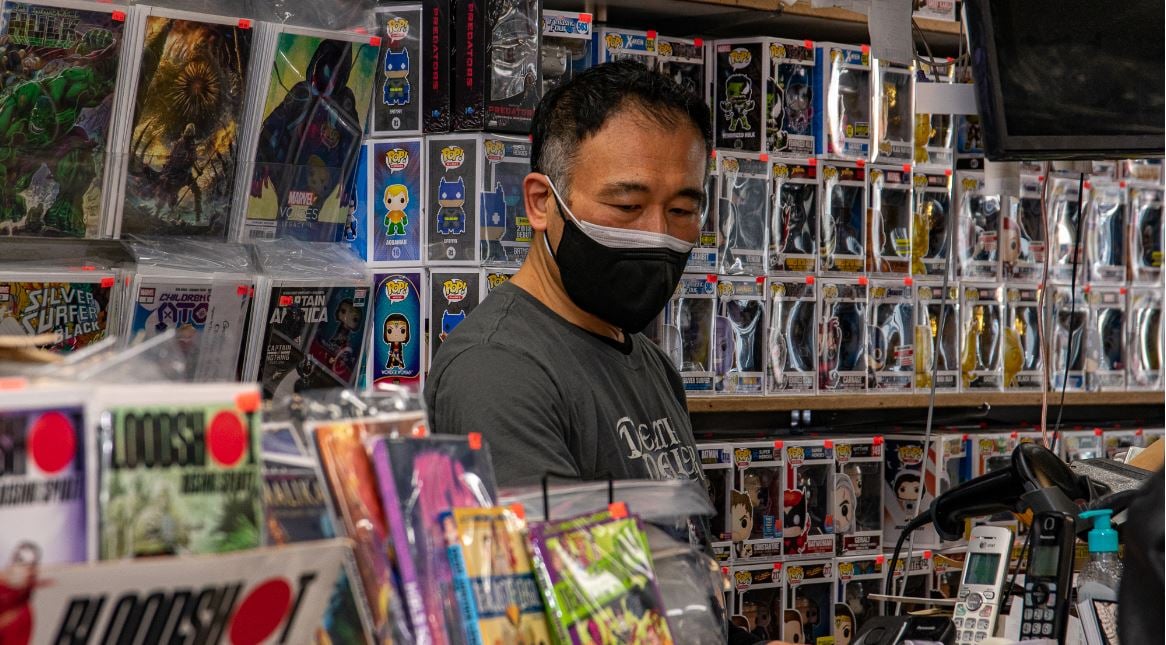
I sat down with Hank, in Bulletproof Comics, to discuss just how he and his employees managed to keep the store’s heart beating despite the pandemic and how the community that supported his store showed up to keep it all going.
RICARDO SERRANO: Thinking about those weeks just before the pandemic started, as it became a real and dangerous thing that forced everyone to stay in, how was the store doing? What were your views on the industry then?
HANK KWON: I think the comic industry was in serious trouble before the pandemic, in terms of single-issue sales. I told everybody the system is kind of broken. There was too much product out there and Marvel added to the problem by producing so many covers for each issue. It was flooding the market and it’s still not healthy.
You want to cultivate the readers, not speculators. Collectors are fine if they’re a combination of the previous two, but if you’re just catering to the speculators, eventually the bubble’s going to burst. So yeah, I was worried. The pandemic put all of that in a whole different context.
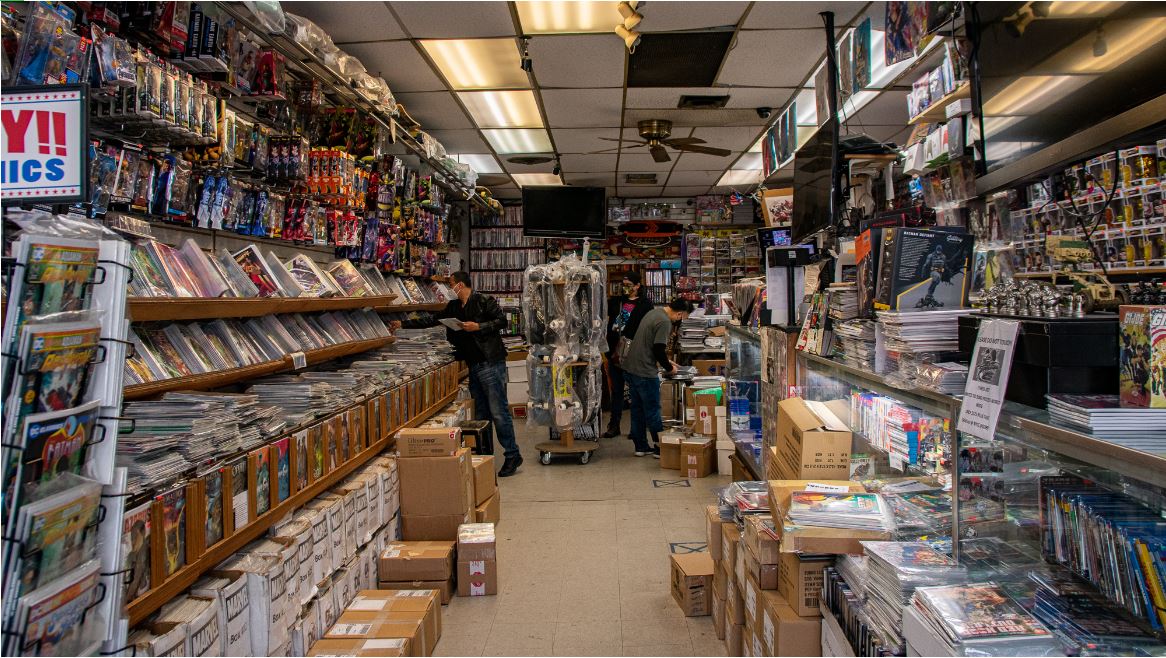
SERRANO: What helped you stay in operation during the pandemic that might’ve carried over from the work you put into the store in previous years?
HANK: A lot had to do with the fact we’re very diversified. We carry a lot of product. We don’t just sell comic books, even though we’re primarily a comic book shop. We have our own exclusive comics, skateboards, video games, card games (Magic being among my highest sellers) and now we have an online presence. It was a matter of making the store come alive online.
In essence, the pandemic required us to reinvent the store experience. That’s when we started online sales. We had built a strong community over the years, from Brooklyn College students to skateboarders that either got into comics while coming to the store for their skating needs or by bringing their comic interests with them. We needed to keep that same community in mind when making decisions. We wanted to make them feel their store was still there for them.
So, we started thinking about Facebook live for store auctions (which still take place every Wednesday in the afternoon). When that took off it did really well, plus it kept us busy. It allowed me to hold on to my employees as well, so no one was laid off. In fact, they were getting more hours. Sometimes they were kind of wary coming into the store because of the COVID situation, but we followed the protocols and kept the store safe.
Some of the people I know in the industry didn’t pivot so well, though. Those that didn’t pay well or that didn’t think outside of the box got into serious trouble. The combination of rent, taxes, and utility bills cut into their funds and made it hard to stay open. And then you had that Diamond had stopped distributing new material, which meant we needed to come up with new ways to put the product we already had at the forefront. That’s how we gave new life to our backlog of comics. We presented them in a new way, like books you probably hadn’t read yet and now had the chance to do so.
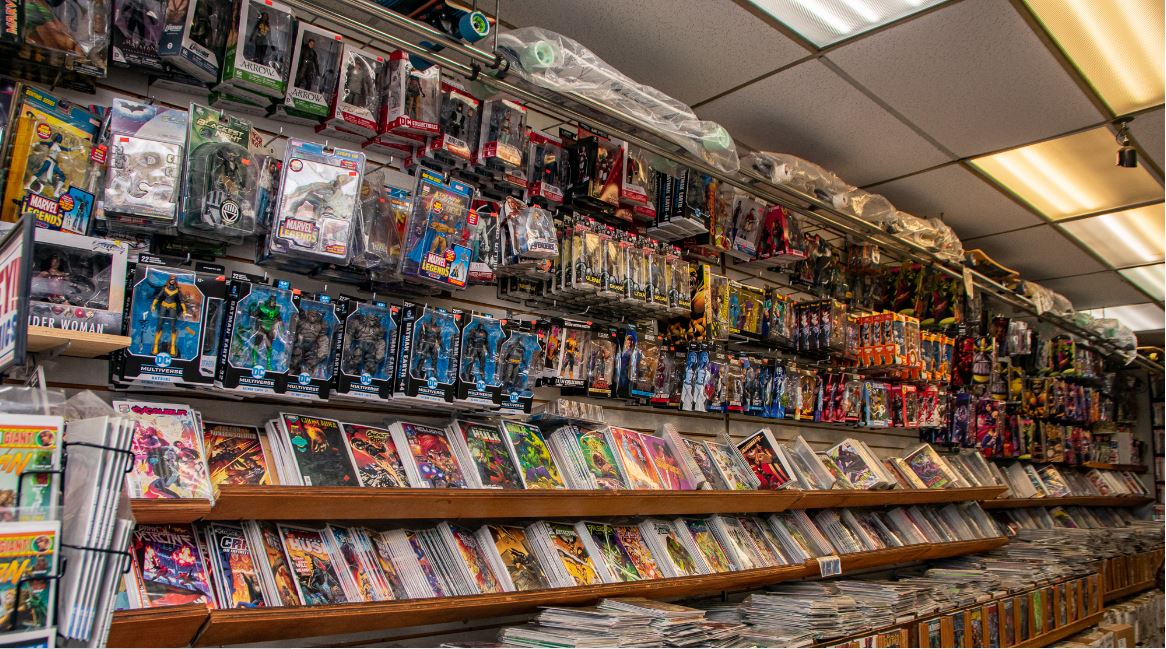
SERRANO: Can you expand on how that pivot into online sales gave the store a fighting chance during lockdown?
HANK: So, immediately from the day we closed—when they announced that Diamond would stop delivering product and both the mayor and the governor announced that non-essential businesses must close—we started shooting video of the different sections inside the store and we put it online. We wanted to create an online browsing experience. So even if customers just went to my Facebook page, they were going to see a series of videos on one of the comic sections, for instance, and we’d go into in-depth look at our inventory. Same thing with our skateboarding section and our playing cards section. Since customers couldn’t go out either, they would comment on the feed or the video post itself with their selections or interests and then we would reach out to them and mail out their purchases. A week after doing that, we started our Facebook live auction sessions. Bringing the full store online was just too exhausting.
SERRANO: I know you’re still doing the auctions, but do you see yourself keeping up with them further for an even longer period of time? Is it now a part of the Bulletproof experience?
Hank: Yes! So as long as they would have me, I’m going to continue doing them. The customers kept on telling me, “please, don’t stop!” It’s just so much fun. The customers were having fun. I was having fun.
You know, the auctions were supposed to only go for two hours originally, but they were running for about four hours. We even started having industry discussions and making friends. It was like a living online comic shop, or a virtual comic shop where you can discuss anything you want. We were lucky enough to have a group of people that was very like-minded. Everybody was supportive of each other. They were friendly, and very respectful.
We even started doing the auctions twice a week, and everybody was looking forward to it. The best part was seeing people support each other even when they got outbid by another customer. It was encouraging. It was a way of bringing the community into the store.
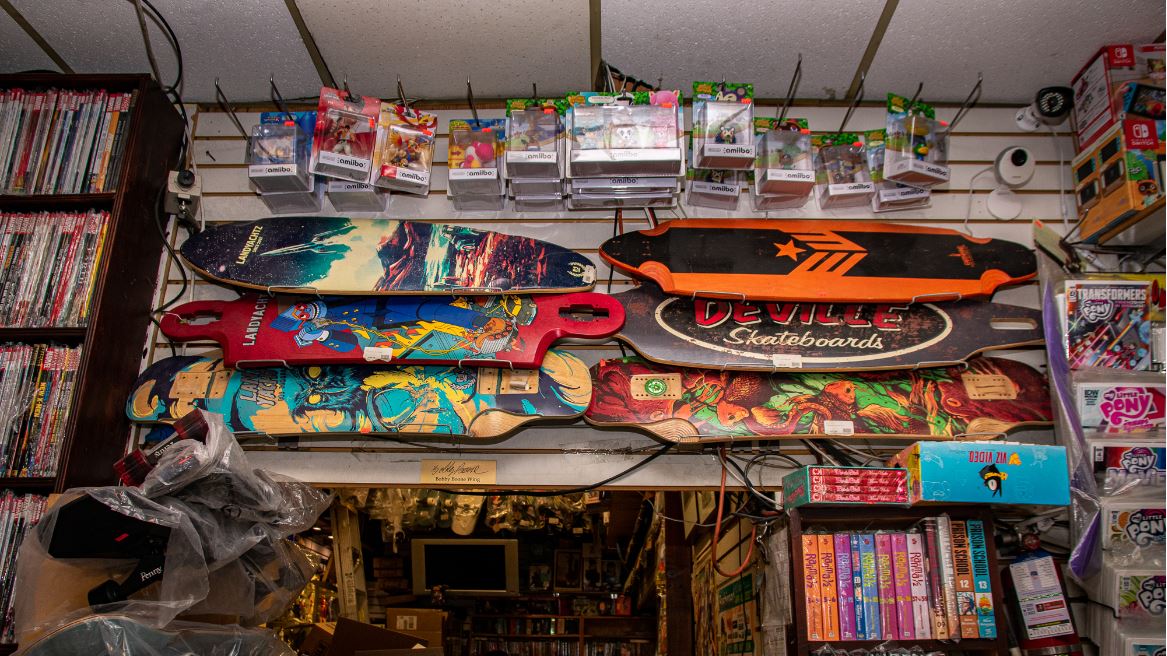
SERRANO: And how did you land on the comics or the items that you wanted to showcase in the auction?
HANK: It was kind of helter skelter. We were very unorganized in the beginning, so we didn’t know what was working and what wasn’t. We didn’t really have a template. After a few sessions, though, I start getting requests from customers for books that we didn’t really carry as much before because they wouldn’t sell. People saw them in the auction, renewed their interests, and now we regularly carry those books.
SERRANO: We spoke earlier about how some comic shops got hit hardest because they didn’t adapt to the reality of a full lockdown. What would be your advice to the comic shops that managed to survive the worst of the pandemic but are still struggling to recover at this stage?
Hank: Look, you’ll get a curveball thrown at you every day in this business. You have to react and adjust. You have to be able to reinvent yourself at a moment’s notice and you’ve got to realize that people are not going to conform to you.
Conform to people, embrace technology, use the things customers use nowadays to get their stuff and be good at it. Be up on trends and study them. The main thing is you have to diversify. If I only had comic books to sell, because I’m in a very high rent district, I couldn’t survive. I wouldn’t be able to even hire workers. I’d have to do it all by myself and go out of business, eventually. So you have to completely diversify the store. If one industry collapses, for instance, then you have cards or skateboards or video games to fall back on until you come up with a plan.
Also, and I think most importantly, you have to create a community in your store. People that want to spend time in your store are your most valuable asset. They give a store life and culture. If customers know that going to the store means hanging out for a while and talking to like-minded individuals about the stuff you like while feeling entirely welcome to do so, then you’ve just taken that extra step to make sure your shop stays open for years to come.
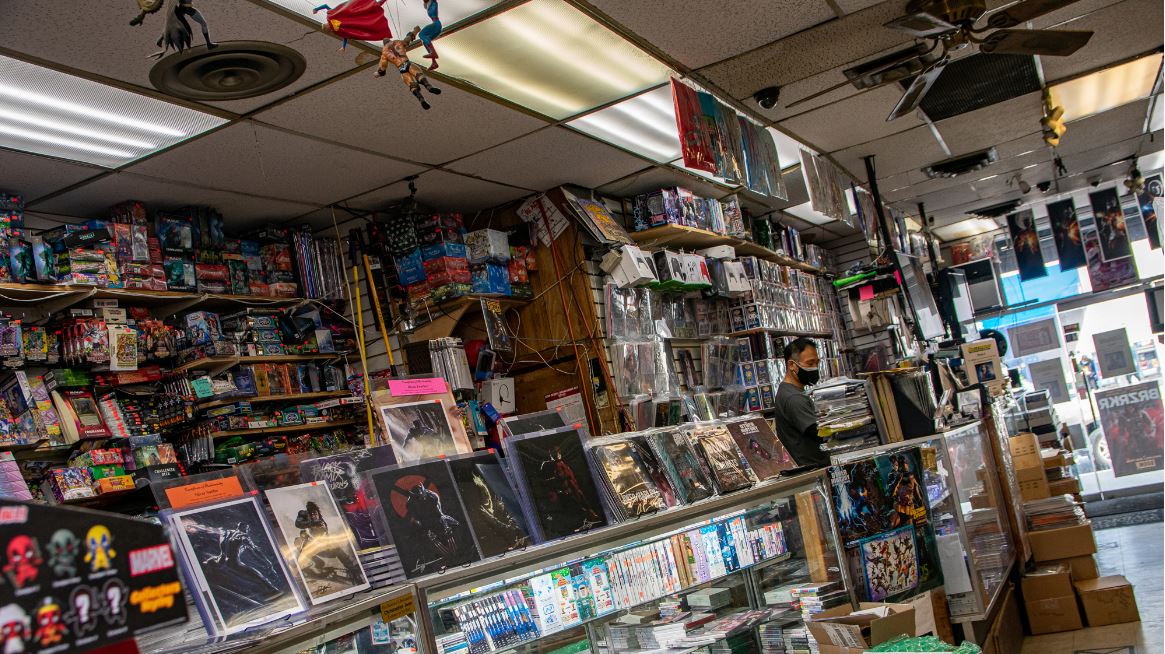


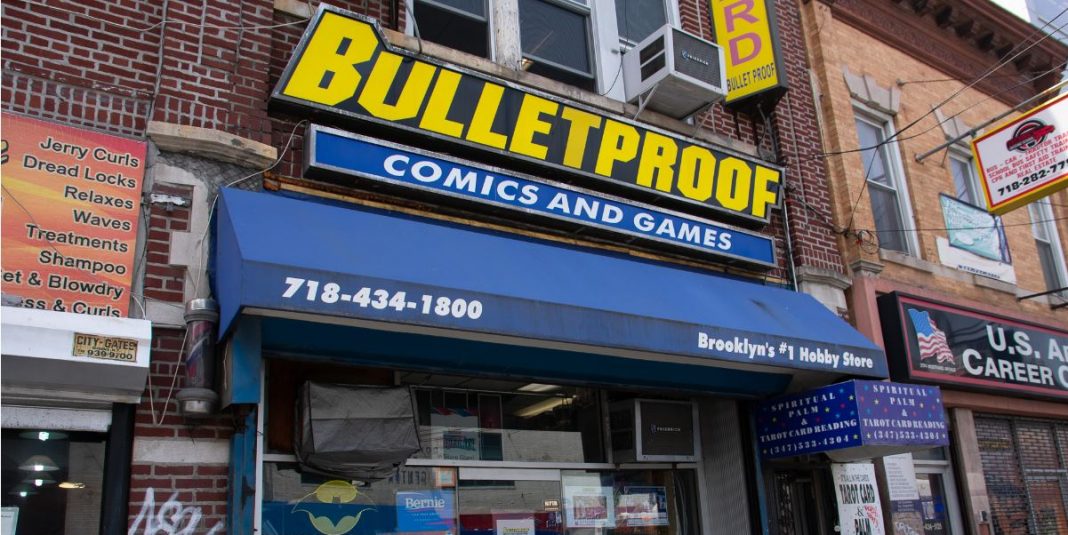






Dude who commission a million store exclusives complains about variant covers from the jump…classic.
Comments are closed.